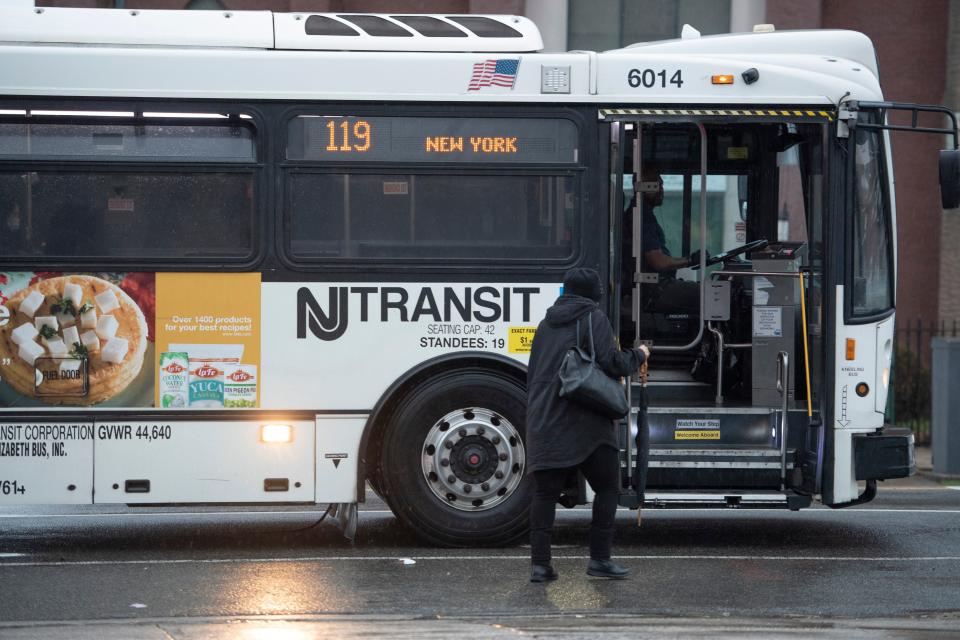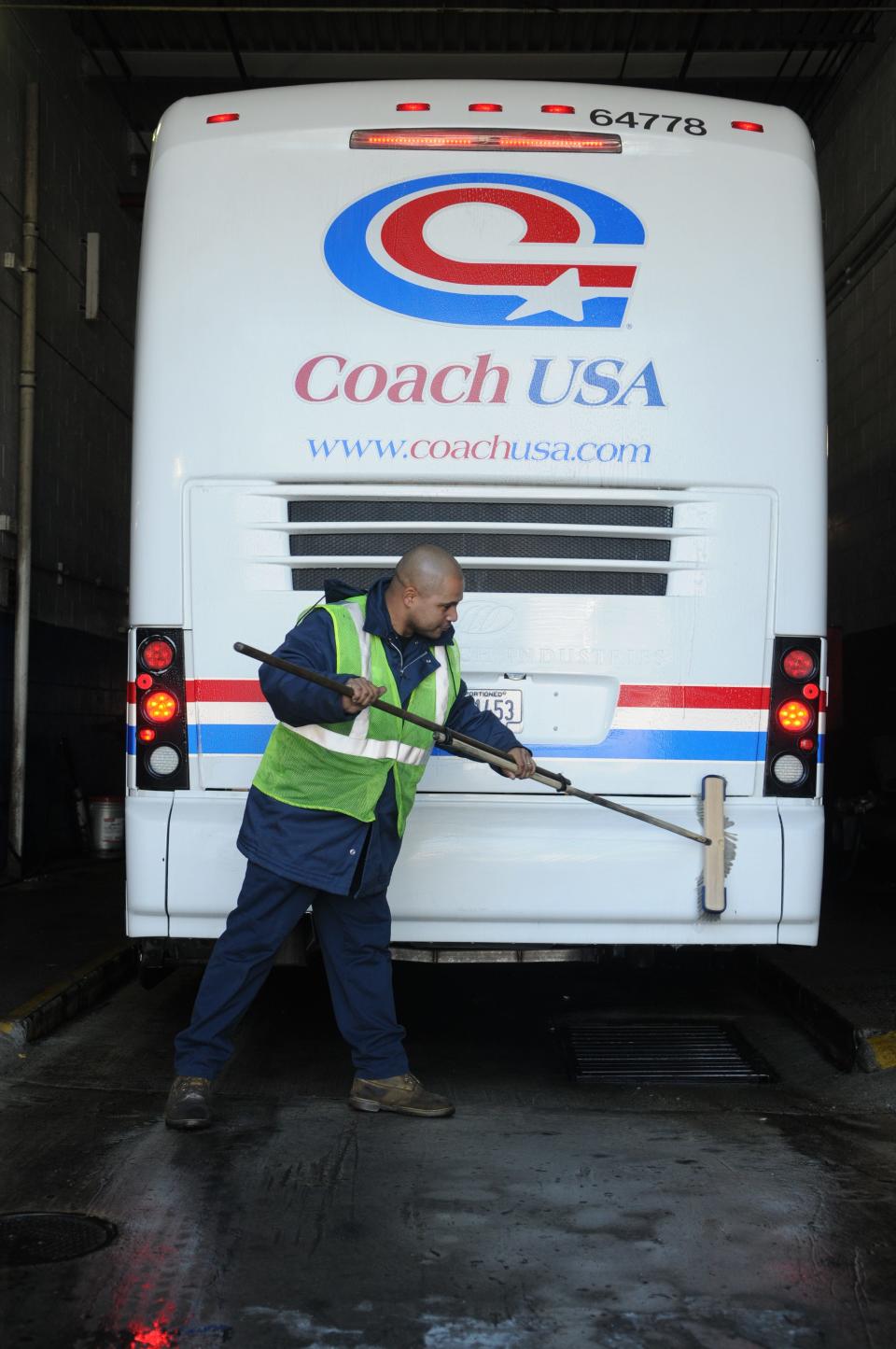NJ Transit bus ridership has bounced back post-COVID better than train use. Here's why
More frequent and reliable NJ Transit bus service is paying dividends in ridership, especially on the corridors it took over from Coach after the private company announced this summer that it would no longer service three routes in Newark.
Across NJ Transit's system of 263 bus routes, its daily weekday boardings for October were about 480,000, up 14% since August, when the number was 421,000, according to data provided by Michael Kilcoyne, senior vice president of surface transportation at NJ Transit.
Of that systemwide total, local ridership within New Jersey accounted for about 231,000 bus customers per weekday in October. That means local ridership has rebounded to about 95% of what it was before the COVID-19 pandemic in 2019.

At the same time, NJ Transit's interstate service to New York, which is largely white-collar commuters, is at 86% of pre-COVID levels, with 202,000 average weekday boardings in October.
That average jumps midweek, Kilcoyne said.
“This number climbs from 202,000 to 218,000 on Tuesdays, Wednesdays and Thursdays. The delta between our Monday and Friday ridership is significant,” Kilcoyne told the customer service and operations board committee members on Tuesday.
By comparison, NJ Transit's rail ridership recovery is about 70%, which goes up to 80% midweek and is at pre-COVID levels on the weekends. Light rail has recovered about 85% of ridership when compared with pre-pandemic numbers.
'Herculean effort'
Three weeks ago, NJ Transit took over three bus routes operated by Coach that the company said it could no longer service because of increased costs and because ridership has never bounced back to pre-pandemic levels.
In that short period, NJ Transit is eclipsing the ridership numbers Coach had on those routes — especially on weekends, when ridership is up more than 70%.

Kilcoyne said this was due to the “Herculean effort” of multiple teams that support bus operations, which improved reliability and increased the number of trips on these routes by extending Monday-to-Saturday service to midnight or later and reestablishing Sunday service.
“The bus operation staff has really done yeoman’s work here, and I can’t thank them enough,” he said.
Here’s the ridership breakdown Kilcoyne provided:
No. 24 — the Central Avenue Corridor, serving Orange, Elizabeth and downtown Newark
Under Coach, the average weekday ridership was 4,300 customers. In the three weeks since NJ Transit took over, ridership increased 41% to 6,170 weekday customer boardings.
On Saturdays, NJ Transit now has 4,350 customer boardings, 71% higher than Coach’s Saturday ridership numbers.
On Sundays, NJ Transit now has 1,918 customer boardings, 75% higher than Coach’s Sunday ridership numbers.
No. 31 — the South Orange Avenue Corridor, serving South Orange to Newark Penn Station
Under Coach, the average weekday ridership was 1,800. Since NJ Transit’s takeover, ridership has increased 47% to 2,650.
The biggest standout is this line’s Saturday ridership. Coach had 699 customer boardings; NJ Transit’s ridership is now at 1,474, a 111% jump.
On Sunday, Coach’s ridership was 422; under NJ Transit, it’s now up to 742, a 76% increase.
No. 44 — Connects Newark Penn Station and downtown Orange and East Orange
Under Coach, weekday ridership was around 620; since NJ Transit took over, it’s up to 780, a 25% increase.
NJ Transit takeovers show success
Similar drastic increases in ridership took place after NJ Transit took over the Nos. 10 and 119 bus routes in Jersey City in 2022. These were among the routes once serviced by Academy Bus, the company accused of failing to operate tens of thousands of trips for years and fudging the numbers on spreadsheets used on invoices for NJ Transit. The company settled the state’s lawsuit last year for $20.5 million.
More: Is your NJ Transit bus on time? Who knows? Riders and travel app maker say data is flawed
More: Dependent on public bus service, urban riders worry at possible NJ Transit cuts
Those two routes alone serve 15,000 passengers a day, up 78% from 8,700 a year ago, Kilcoyne said.
On Saturday, NJ Transit began service on three routes served by the A&C Bus company, which also announced this summer that it was terminating service after poor ridership return post-pandemic and increased expenses.
Plea for more state aid
The booming bus ridership numbers come after NJ Transit modified routes and added 346 bus trips in June — a response to customer feedback for more service on some of the most popular routes and summer seasonal service, as well as a growing warehouse employment zone near Port Newark and the agency's taking over DeCamp routes after that company ceased commuter bus service in April.
However, Kilcoyne and NJ Transit President and CEO Kevin Corbett warned that these service improvements and the agency’s future ability to add bus trips, take over private bus service areas and extend routes where needed is contingent on additional aid.
“It’s a good example of what we can do given those resources,” Corbett said. “The reason we’re taking over those services is when you get in that death spiral and start cutting back and you get the reductions … you end up with a situation that Mike and his team inherited.”
The estimated costs to take over the Coach and A&C routes is a combined $27 million in new annual expenses.
NJ Transit is undergoing a “restructuring” effort to cut costs ahead of a $119 million budget deficit predicted in fiscal year 2025 and a $917.8 million shortfall expected in fiscal year 2026. The agency is examining corporate cost-cutting, service changes or cuts, layoffs and fare hikes.
NJ Transit, unlike its other transit agency peers around the country, does not have a constitutionally dedicated source of funding from state or local sources.
This perennial problem — perpetuated by four decades of inaction on the issue by New Jersey governors and Legislatures — has hampered NJ Transit’s ability to do long-term planning and capital investments, like badly needed improvements to its 16 outdated and overcapacity bus garages and building new bus garages in high-demand areas like North Jersey.
At the same time, the agency is trying to provide more flexible service in response to ridership needs, as it has done with its bus service.
In the meantime, Kilcoyne said, the agency is doing everything possible to live within its means.
“In January, we have another schedule change where we’ll be adjusting for the things that we’re seeing now as a result of the October change and, where resources permit, we will be applying some added services,” Kilcoyne said. He said the agency will add more 60-foot buses, which increase capacity by up to 40%.
He said the agency can add large passenger-carrying vehicles to areas experiencing overcrowding and solve the problem without having to change the schedule. “We’re looking forward to some of those enhancements next year, which help us manage the service within our constraints, while paying close attention to taxpayer dollars,” he said.
This article originally appeared on NorthJersey.com: NJ Transit bus ridership has bounced back after COVID

